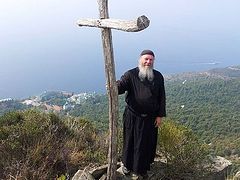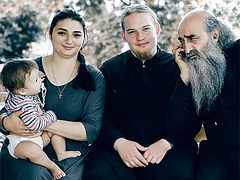 Metropolitan Vladimir (Samokhin) of Vladivostok and Primorye.
Metropolitan Vladimir (Samokhin) of Vladivostok and Primorye.
Metropolitan Vladimir talks about how God’s Providence is revealed in our lives, what it means to be a “spiritual father”, and spiritual laws.
—Divine Providence works in the lives of all of us, though sometimes it is hidden and sometimes it manifests itself clearly in various signs, remarkable meetings, timely words, etc. Your Eminence, dear Metropolitan Vladimir, can you tell us if you have experienced any signs or obvious manifestations of Divine Providence in your life? Can you share any stories with us?
—To understand the will of God is the primary aim in the life of every Christian. I know by experience that it is not until many years later that the hidden meaning of the events you providentially had to go through is revealed to you. There is a serious risk of misinterpreting these events by yielding to the momentary impulses of your soul, ultimately getting an absolutely false idea of yourself and God’s work. Hypersensitivity (especially in spiritual life) is never helpful, so I try to be very wary of interpreting the Creator’s Providence.
To penetrate into the depth of the riches both of the wisdom and knowledge of God (Rom. 11:33) you need to possess the gift of discrimination. But there are critical, crucial points in our lives when the Lord reveals Himself in special ways, often in response to somebody’s fervent and sincere prayers.
For me personally my monastic tonsure was a very strong moment. When Metropolitan Paul (now Metropolitan of Minsk and Zaslavl) pronounced my new name, I felt like something had pierced me from inside. I instantly recalled the words from the Epistle to the Hebrews: For the word of God is quick, and powerful, and sharper than any twoedged sword, piercing even to the dividing asunder of soul and spirit (Heb. 4:12). These words are so true. When I heard him give me the name Vladimir, in honor of the holy Baptizer of Russia, I really felt it was Divine Providence in action. I took that as the Creator’s purpose for my life and exactly what God wants from me.
Later, when I was called to archpastoral ministry, the meaning of my new name was revealed to me more fully: to do all in my power to enlighten people both morally and spiritually so that the salvific light of the Gospel might shine in their hearts.
But, as a rule, illumination doesn’t come many times during your lifetime. In most cases significant events happen imperceptibly or even in the form of humorous occurrences.
One day, when I was studying at the Kaluga Theological Seminary, we seminarians went on a pilgrimage to Optina Monastery. Our group was headed by Archbishop George (Gryaznov; 1934—2011) of Lyutinovo. Suddenly, without any obvious reason, he called me and blessed me to carry his staff. Just imagine: there was a crowd of students, with his subdeacons among them, but the archbishop chose me. And I, a very young seminarian, carried the archbishop’s staff with reverence on the territory of the monastery for three hours. Now I recall that story with a smile, but then I took it very seriously—as an obedience.
You know, you can only see the big picture from a distance. With time the chain of “strange coincidences”, like pieces of a puzzle, form into a detailed, complete picture of the divine plan. If something is going on “here and now”, it is hard for us to evaluate the current situation and understand its meaning.
For instance, when I served in Ryazan and was pro-rector of a theological seminary, all of a sudden I was appointed as dean of the Skopin district and rector of St. Nicholas Church (the parish where my life in the Church had once begun). I couldn’t figure out why I should combine my work at the Ryazan Theological Seminary with the position of the head of a deanery.
It was years later, when the Lord called me to serve as the Bishop of Skopin, that I realized how important the experience I had gained was for me. Over that period I had succeeded in establishing constructive interaction with the authorities and benefactors, so that by the time of my consecration as a bishop I aleardy knew the situation in the region very well. I didn’t have to start from scratch. I am convinced that it was an act of Divine Providence.
—Can you tell us about the people you met in your life who have most influenced you spiritually?
—As a rule, your strongest impressions are associated with your childhood. When I was making my first steps in the Church, I began to attend the small cemetery Church of St. Nicholas of Myra in Skopin (then the only active church in the town) and help in the altar. There I met wonderful people and true pastors—devout, heedful of others’ needs, men of remarkable Christian simplicity and modesty. They became my first instructors and preceptors in the faith. I learned from their deeds rather than their words. The example of their lives inspired me to devote my life to Church ministry.
As for my mature years, Metropolitan Simon [(Novikov; 1928—2006); Metropolitan of Ryazan and Kasimov between 1972 and 2003.—Trans.] and Metropolitan Paul (Ponomaryov), the current Patriarchal Exarch of All Belarus, played a huge role in my life and development. The former blessed me when I was fifteen to study at the Ryazan Theological College and then the Seminary, and the latter ordained me as a priest and tonsured me as a hieromonk.
Metropolitan Paul always treated me with paternal affection. It is with gratitude and warm feelings that I recall our talks, during which he would share his life, pastoral and spiritual experiences with me. I gained a lot from those conversations. For example, I was struck by his unique ability to give administrative tasks a spiritual dimension. He would look at any work or undertaking through the lens of faith, striving to discern the spiritual meaning in those things and calling on me to do the same. Today, keeping that instruction in my memory, I try to follow his wise advice.
—Your Eminence, may I ask you about your favorite saint (or saints)? How does your spiritual relationship with these saints manifest itself in your life?
—First of all, our spiritual bond with saints is revealed in our prayers and their answers to them. A telling example is an interesting episode that took place when I lived in Khabarovsk. We were building a church and at some point we had exhausted our funds. Our work stopped, and we had nowhere to get money from. I racked my brain, unable to find a solution to the problem. Whom did I not ask for help!
On the eve of St. Nicholas’ feast-day on December 19, I was celebrating the Vigil and fervently imploring the saint to sort things out, because we only hoped for a miracle. And the saint didn’t keep us waiting long for his answer! No sooner had the service finished than we got a call from a benefactor who was willing to donate the amount of money we needed.
I think all believers have similar stories related to this wondrous saint of God to share. I can even say that I have been guided by St. Nicholas the Wonderworker my entire life. I began my Church ministry at the St. Nicholas Church in Skopin. This God-pleaser is extremely important to me and I feel spiritually connected to him in many aspects of life.
I also have special affection for St. Alexander Nevsky, St. Sergius of Radonezh and St. Seraphim of Sarov, and, of course, for my patron-saint—Holy Prince Vladimir, Equal-to-the-Apostles. And, since I was consecrated as a bishop on the feast of St. Philaret of Moscow (and at the Cathedral of Christ the Savior in Moscow, where his relics rest), I revere this outstanding archpastor as my protector and spiritual director as well, and often seek his intercessions in prayer.
—Your Eminence, what do you think of spiritual guidance? What mentors can be called spiritual fathers? What qualities should they possess? What temptations should be avoided? Could you draw any examples from your personal experience?
—The concepts “spiritual instructor” and “spiritual father” are similar in meaning. I don’t think they should be separated one from another artificially. Today both are united in one person: a priest whose pastoral duty is to instruct others in the faith and guide them to Christ.
At the same time, the question you’ve asked is very important and painful. It is so important because since recently the image of spiritual father and the understanding of the meaning of fatherhood have been in a deep crisis. This has to do not only with the fact that after the Revolution the spiritual traditions in Russia were discontinued for several generations, but also with the universal crisis of family values. A misunderstanding of the essence of motherhood and fatherhood and a wrong approach to parent-child relations are projected onto the spiritual sphere, and these distortions have more detrimental effects as they concern the salvation of the soul.
What is the essence of spiritual fatherhood? In a nutshell, it is about helping people to be born into eternity. The following words of Archimandrite Gabriel (Bunge) resonate in my heart:
“A spiritual father can be compared with an art restorer who is not restoring an image of God that has been entrusted to him in his own image by making a copy of himself; rather, he is trying to make it similar to the Prototype—that is, to Christ.”
A spiritual father should never overshadow the figure of Christ and take the place of Christ in his spiritual child’s life. He is simply a guide to the Heavenly Kingdom.
If a priest keeps this in mind as his ultimate goal, he will never allow himself to be tyrannical, domineering and “ride roughshod over” his spiritual child, ordering absolute, blind obedience and “worship” of himself. The characteristics of a genuine spiritual father are his tender love, patience, tactful behavior and concern for his spiritual child, because our Lord Jesus Christ died for everyone without exception.
Every father helps his offspring live his own free life. Will we call a father who leads his adult child by the hand like a baby “normal”? Every father is obliged to teach his baby to walk independently. There is the same law in spiritual life.
The aim of a spiritual father is to ensure that his spiritual son or daughter comes unto a perfect man, unto the measure of the stature of the fulness of Christ (Eph. 4:13)—that is, attains true personal knowledge of God. That’s why, if you hear somebody say: “What will we do without our pastor? Our life will end without him! He is everything to us!”, know that they are in a delusion, or in prelest, to use the term of the Holy Fathers. If a pastor agrees with such sentiments and indulges them, it means he failed to understand the essence of spiritual fatherhood and has usurped the position of Christ.
The problem with “young elders” (mladostarchestvo) has been discussed in our Church for many years. And, regrettably, the number of these pseudo-elders hasn’t dropped. And I should say that their immediate circle is first to blame because these people hurry to recognize their priest as a “spirit-bearing elder.” That is a very severe temptation for a priest. Any pastor must do all in his power to prevent such an unhealthy attitude towards himself.
The temptations that priests have to face are innumerable. But, in my view, the following requires their undivided attention. Firstly, pastors shouldn’t imagine themselves to be “spiritually advanced.” They must avoid giving advice on matters outside of their knowledge and teaching things they still don’t know by experience. They should be honest and admit that there are things they don’t know or understand. Spiritual discrimination is necessary in all situations. Secondly, they must avoid being intoxicated with their own spiritual authority and influence. Once a priest has noticed this in himself, he must repent and nip it in the bud.
Another frequent temptation, or excess, is discussing some sins in every detail. A priest may think that he is pursuing a noble goal, helping someone else analyze and understand the reason for his fall. But a spiritual father’s mission is different! His task is to help him who has stumbled rise again and not “smear” him with “filth” and then rub his nose in it. We must keep in mind that our ultimate aim is the Heavenly Kingdom, and we are supposed to direct our spiritual children to this aim.
—There are spiritual laws in our lives. There are such life situations when these laws are revealed to us through our spiritual experience. Your Eminence, can you share some of such stories with us?
—If thou come to serve the Lord, prepare thy soul for temptation (Sir. 3:1). We mostly see this very law in action. Once you’ve commenced some important work, various trials appear.
When beset with difficulties, I always recall the uplifting words of Elder Ephraim of Katounakia, a disciple of St. Joseph the Hesychast: “The greater the temptation you can endure with gratitude, the greater the degree of grace you are entitled to.” So I try not to lose heart, to be patient and give thanks to God for everything, hoping that He won’t leave me no matter how bad the situation may seem.
There is also the following principle: the more you devote yourself to a good cause, the more energy you get. His Holiness Patriarch Kirill once said that we should pour all our being into the Church and God’s work without sparing ourselves, exerting ourselves to the limit—one hundred percent—then the Lord will not only restore our depleted strength but even increase it. By sparing your strength and pitying yourself you damp down your enthusiasm and ardor and become demoralized. This way you can easily become like the character from a Gospel parable who looks back after putting his hand to the plow (cf. Lk. 9:62).
Another law that I have seen in action many times in my life is the law of obedience. I believe many hierarchs agree with me, especially those who have extensive experience in archpastoral ministry: all of us have to deal with disobedience. Sadly, over the years of my ministry in different dioceses I have many times dealt with people (both clergy and laity) who are openly opposed to the Church hierarchy and behave in an impertinent, provocative manner. Of course, I won’t disclose their names because most of them are still alive and this may affect their spiritual life.
Need one look far for an example? Let us recall the events of the recent months when in our countries and other states restrictions were imposed due to the pandemic. Patriarch Kirill himself called on the faithful members of the Church to observe the health regulations during services and later to avoid going to services and pray at home until the epidemiological situation changed. The ruling hierarchs of the dioceses with difficult epidemiological situations asked believers to do the same. We know that it caused a barrage of criticism, sharp objections and outrageous statements directed at the Church authorities from representatives of clergy and laypeople. Some of these scandalous statements were discussed by the whole nation.
People eagerly plunge into arguments in the style of: “If I were a manager”, “trying on the boss’s clothes” and ignoring the heavy burden of responsibility the authorities have to bear. Self-conceit begets condemnation, malicious slander and even hatred. Here we cannot but recall the words of the famous philosopher and cultural theorist Gregory Pomerants (1918—2013): “The devil begins with froth on the lips as if he were an angel entering battle for a holy and just cause[1].”
I would like to stress that the fruits of disobedience are both bitter and toxic. They are bitter not only because of the deplorable consequences they bring, but also because the souls of such people don’t feel the sweetness that comes out of true the humility of those who endure sorrows with patience. And they are toxic because such people drain themselves spiritually. No matter how many spiritual fruits they may reap by fasting and prayer, these fruits become worthless, crumble to dust and come to naught because, having yielded to pride, such people think that they understand everything better than the others.
I am convinced that the pandemic should serve as a valuable lesson for us: We should learn to trust God and His most gracious Providence with all our hearts.
—Your Eminence, what would you wish for our readers in conclusion?
—I won’t be try to be original and will say what any Christian would say: I wish all of you eternal salvation. The merciful Lord gives us many opportunities for that. May He send you spiritual strength to use them so that you can be strengthened in your faith, inspired by hope and grow in charity. May the blessing of God be with all of you!



